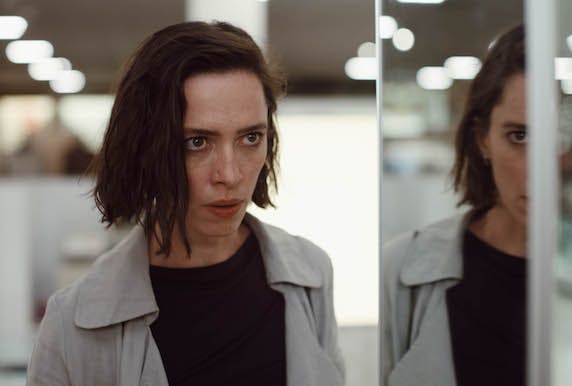In ‘Resurrection,’ Rebecca Hall Shows Off Her Mastery of Difficult Terrain
Also, Tim Roth gives one of his best performances in years as the controlling psychopath.

On screen, the British actress Rebecca Hall has portrayed many self-possessed yet vulnerable characters, a particular duality that she’s mastered. In the fantastic “Christine” from 2016, she played a principled TV reporter who becomes increasingly unstable as she battles depression and media sensationalism. In 2017’s “Professor Marston and the Wonder Woman,” she’s a confident wife who consents to her husband’s affair, only to fall in love with the other woman.
In “Resurrection,” opening at the IFC Film Center on Friday, Ms. Hall plays a self-assured, successful, professional woman named Margaret who has a past that haunts and, eventually, catches up with her. This past involves an older man, David (Tim Roth), whom she had a relationship with when she was 18. In a stunning scene about 30 minutes into the film, she relates what transpired between the two, a tale of grooming, abuse, and menticide.
I’m not entirely sure how long this scene runs, but it must be more than five minutes of unedited monologue — a notably long time for a film. Ms. Hall accomplishes quite an acting feat, acutely swinging from commentator to victim in her delivery of some harrowing, deeply unsettling details.
When David reappears in her life years later, Margaret becomes increasingly afraid of what he may do to her daughter, a smart teenager about to enter college. Triggered by his presence and determined to shield her daughter, she begins to lose her grip on reality by not going into work and instead following him down desolate streets and under elevated highways. Stronger visual artists may have employed these settings to better reflect Margaret’s state of mind, but director Andrew Semans and cinematographer Wyatt Garfield don’t do much with the Albany locations. Still, some of the antiseptic interiors they use do add to the dread as Margaret grows more and more obsessive.
While David gaslights his way into Margaret’s life again, he speaks with her in an unaffected tone of voice that’s all the more menacing because it sounds rational. As the controlling psychopath, Mr. Roth gives one of his best performances in years, though the script provides scant motivation for the character’s desire to re-enter Margaret’s life after 22 years. It’s possible that one can never understand the motives of a truly demented person.
Ultimately, though, the movie lives or dies on Ms. Hall’s portrayal, and she again proves quite adept at portraying a character who vacillates between a strong will and a stronger weakness. Even so, viewers might be shocked to see her progression as the movie builds to its climax, her face and body growing more gaunt and wiry. Her performance is an exacting physical portrait as much as a psychological one.
When the final confrontation between Margaret and David arrives, it explodes with all the violence and gore the movie has been hinting at via its pseudo-revenge plot and fomenting through dark-hued lighting and ominous music. If the metaphorical portent of the title “Resurrection” becomes thuddingly obvious in this scene and its imaginary denouement, the emotional force of a traumatized mother enacting some sort of justice remains with the viewer.
It’s a fittingly disturbing end to a monstrous but awfully believable story of toxic, murderous masculinity.

